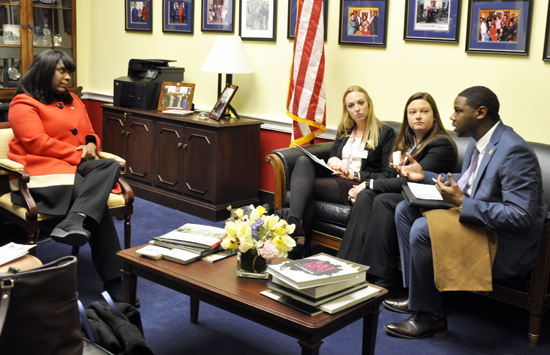Web ExclusiveFlying Into Advocacy, Policymaking, and Educational Opportunity
From left: Representative Terri Sewell (AL-D); Piper Grant, BSW student; Kimberly Gibson, MSW field coordinator; and Johnny Jenkins, MSW student, from the UA School of Social Work. Photo courtesy of Olivia McMurrey Application. Interview. Acceptance letter. Training. Fly in to Washington, DC. These are just a few of the steps taken by students interested in strengthening their policy and advocacy skills through an experiential learning opportunity known as the Fly In. In March 2019, the University of Alabama (UA) School of Social Work hosted its Third Annual Policy and Advocacy Fly In to Washington, DC. Created in 2017 as a response to the Council on Social Work Education’s (CSWE) initiative to infuse policy and advocacy into field education curriculum, the school created a two-day spinoff from their 40-year semester-long Washington, DC MSW internship program. The Fly In offers an innovative way of immersing students in policy and giving them the opportunity to refine their analytical skills and learn effective advocacy. This in-depth policy practice and advocacy experience is a UA systemwide experience. Students from UA and UA in Birmingham participate and the UA in Huntsville sends students from political science and public affairs. The Fly In was so well received by social work students that word spread and students from numerous disciplines including political science, African American studies, criminal justice, public relations, public policy, and accounting also participated. Students are eager to learn more about policy and advocacy, particularly in the nation’s capital. Selection and Preparation Students literally fly in to DC and hit the ground running for their policy and advocacy adventure. There, students learn interesting facts about the country and the building of the nation’s capital, while also visiting the House and Senate galleries to watch policy making and advocacy in real time. Later in the evening, CSWE President Darla Coffey, PhD, MSW, welcomes the group and provides an overview of the importance of policy and advocacy in social work practice, and members of the Alabama delegation are invited to address the group. This time, Alabama students enjoyed a dialogue with four members of the Alabama delegation: Representatives Terri Sewell, Martha Roby, Gary Palmer, and Mo Brooks. Hearing these members of Congress describe collaborating to solve problems had a profound effect on the students as they heard firsthand how these representatives work together, a very different story than what is portrayed in the media. Students meet at the nation’s headquarters for social work, the NASW DC office. They hear from policy experts on each of the identified bills. They break into small groups based on the assigned bill where they further discuss and train on the legislation. Students conclude this portion of the training by role-playing their three-minute advocacy pitches with input from other students and faculty. This experience, complete with questions and feedback, prepares the students for possible scenarios they will face inside Congressional offices. Following a working lunch and encouragement from Angelo McClain, PhD, LICSW, CEO of NASW, students prepare to advocate for each of the assigned bills in groups of four to their two scheduled meetings with members of Congress and staffers. Anxious about what to expect, students discuss how they will advocate and what will become the highlight of their trip. With affirmation from faculty, students enter their first assigned office with a one-page policy fact sheet infographic and confidence provided by multiple training sessions. From Student to Advocate Riding the wave of accomplishment, students enter the Senate room for a panel discussion with alumni of participating social work programs. Buoyed by the realization they can advocate, learn new skills, and make a difference, students learn how other social workers have created fulfilling careers with a foundation in social work. — Carroll Phelps, LICSW, is DC programs coordinator at the University of Alabama School of Social Work. — Kimberly Gibson, LMSW, is MSW field coordinator at the University of Alabama School of Social Work. |


